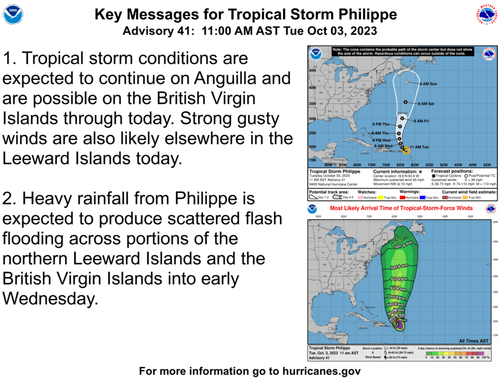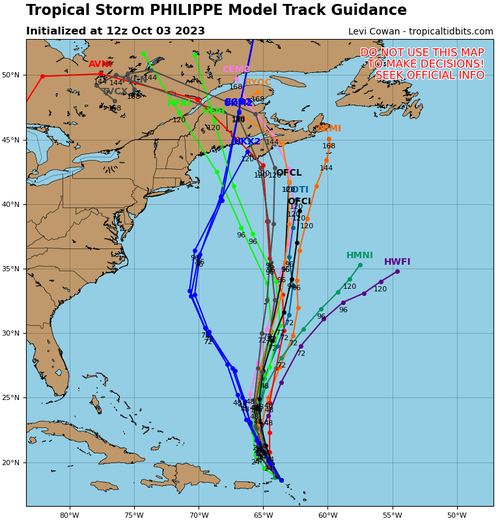
Several weeks after Tropical Storm Lee made landfall in the western part of Canada's Nova Scotia province, another storm is brewing in the Atlantic Basin, with computer models forecasting parts of the US Northeast and Nova Scotia could be hit again.
The latest report from the National Hurricane Center states Tropical Storm Philippe was about 70 miles northwest of Anguilla and about 55 miles east-northeast of St. Thomas, US Virgin Islands, moving northwest at 10 mph with sustained winds of 45 mph.
"It made landfall on the island of Barbuda on Monday with 50 mph winds and is now headed away from the Caribbean into the Atlantic, but its tropical-storm-force winds still extend out 175 miles," according to Orlando Sentinel.
"On the forecast track, the center of Philippe is expected to pass just north of the British Virgin Islands today and then move away from the northern Leeward Islands beginning tonight," NHC wrote in the 1100 ET update, adding, "However, the strongest winds and heaviest rains will likely occur in the islands to the southeast of the center."
Philippe moves slowly northwestward while bringing tropical storm conditions to the northeastern Leeward Islands. pic.twitter.com/mYYMp8mOOb
— CIRA (@CIRA_CSU) October 3, 2023
NHC said, "Little change in strength is forecast during the next day or two, but Philippe could begin to strengthen after midweek."
Models expect the storm to turn north and parallel the US East Coast while at sea, with a potential landfall impact area from Maine to Nova Scotia by as early as Sunday.
So far, the 2023 Atlantic hurricane season has produced 18 named storms and is already above average, according to Phil Klotzbach, a hurricane researcher with Colorado State University.
Several weeks after Tropical Storm Lee made landfall in the western part of Canada’s Nova Scotia province, another storm is brewing in the Atlantic Basin, with computer models forecasting parts of the US Northeast and Nova Scotia could be hit again.
The latest report from the National Hurricane Center states Tropical Storm Philippe was about 70 miles northwest of Anguilla and about 55 miles east-northeast of St. Thomas, US Virgin Islands, moving northwest at 10 mph with sustained winds of 45 mph.
“It made landfall on the island of Barbuda on Monday with 50 mph winds and is now headed away from the Caribbean into the Atlantic, but its tropical-storm-force winds still extend out 175 miles,” according to Orlando Sentinel.
“On the forecast track, the center of Philippe is expected to pass just north of the British Virgin Islands today and then move away from the northern Leeward Islands beginning tonight,” NHC wrote in the 1100 ET update, adding, “However, the strongest winds and heaviest rains will likely occur in the islands to the southeast of the center.”
Philippe moves slowly northwestward while bringing tropical storm conditions to the northeastern Leeward Islands. pic.twitter.com/mYYMp8mOOb
— CIRA (@CIRA_CSU) October 3, 2023
NHC said, “Little change in strength is forecast during the next day or two, but Philippe could begin to strengthen after midweek.”
Models expect the storm to turn north and parallel the US East Coast while at sea, with a potential landfall impact area from Maine to Nova Scotia by as early as Sunday.
So far, the 2023 Atlantic hurricane season has produced 18 named storms and is already above average, according to Phil Klotzbach, a hurricane researcher with Colorado State University.
Loading…






